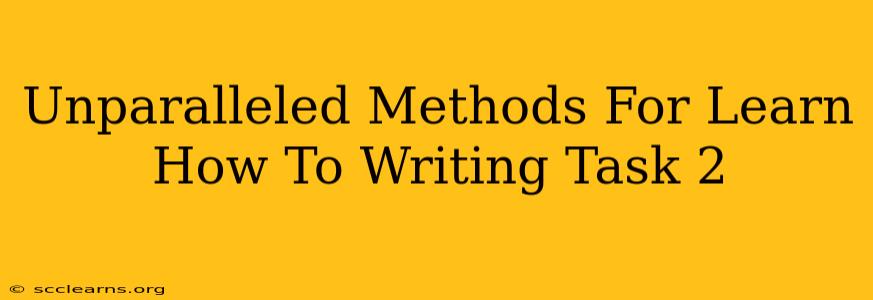Are you struggling with IELTS Task 2 writing? Do you dream of achieving a band 7 or higher? This comprehensive guide will equip you with unparalleled methods to conquer this challenging aspect of the IELTS exam. We'll delve into proven strategies, focusing on structure, vocabulary, grammar, and effective practice techniques. Let's unlock your writing potential!
Mastering the Structure: A Blueprint for Success
A well-structured essay is the foundation of a high score. This isn't about rigid rules, but rather a clear, logical progression of ideas that keeps the examiner engaged. Here’s how to build that winning structure:
1. Introduction: Hook, Thesis, Roadmap
- Hook: Start with a captivating sentence – a thought-provoking question, a surprising statistic, or a relevant anecdote. This instantly grabs the examiner's attention.
- Thesis Statement: Clearly state your position on the essay prompt. Don't be vague; be direct and concise.
- Roadmap: Briefly outline the main points you'll discuss in your body paragraphs. This provides a clear roadmap for the reader.
2. Body Paragraphs: Argument & Evidence
Each body paragraph should focus on one main idea supporting your thesis. Use the PEEL structure:
- Point: State your point clearly.
- Evidence: Support your point with relevant examples, statistics, or reasoning.
- Explanation: Explain how your evidence supports your point. Don't just present the evidence; analyze it.
- Link: Link your point back to your thesis statement, showing how it contributes to your overall argument.
3. Conclusion: Summary & Final Thoughts
- Summary: Briefly summarize your main points. Don't introduce new information here.
- Final Thoughts: Offer a concluding statement that leaves a lasting impression. You might offer a prediction, suggest a solution, or reiterate the significance of your argument.
Expanding Your Vocabulary: Precision and Style
Using a wide range of vocabulary is crucial for a high score. Avoid repetition and aim for precise word choices that accurately convey your meaning. Here's how to enhance your vocabulary:
1. Active Reading and Note-Taking
Read extensively, and make note of sophisticated vocabulary encountered in reputable sources (news articles, academic journals, books).
2. Thesaurus Use (Wisely!)
A thesaurus can be helpful, but don't just grab the first synonym you see. Ensure the word fits the context and tone of your essay.
3. Learn Collocations
Pay attention to how words frequently appear together (e.g., "make a decision," "heavy rain," "strong evidence"). Using collocations naturally enhances the fluency and accuracy of your writing.
Grammar and Sentence Structure: Clarity and Fluency
Grammatical accuracy and varied sentence structures are vital for demonstrating your language proficiency.
1. Focus on Accuracy
Pay close attention to subject-verb agreement, tense consistency, and article usage. Practice regularly to identify and correct your mistakes.
2. Sentence Variety
Avoid monotonous sentences. Mix simple, compound, and complex sentences to create a more engaging and sophisticated style.
3. Use Linking Words and Phrases
Master the use of transition words and phrases (e.g., however, furthermore, in addition, consequently) to create a smooth flow of ideas and logical connections between sentences and paragraphs.
Practice Makes Perfect: The Key to Success
Consistent practice is paramount. Here's a structured approach:
1. Regular Writing
Dedicate time each day to writing practice essays. Aim for consistency, not just sporadic bursts of activity.
2. Feedback and Self-Reflection
Seek feedback from teachers, tutors, or other proficient writers. Critically analyze your own work to identify areas for improvement.
3. Time Management
Practice writing under timed conditions to simulate the actual exam environment.
By diligently implementing these unparalleled methods, you will significantly improve your IELTS Task 2 writing skills and boost your chances of achieving your desired band score. Remember, success in IELTS writing isn't just about memorizing techniques; it's about developing a deep understanding of the skills involved and consistently applying them. Good luck!

